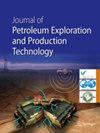Experimental evaluation of corrosion inhibitors for completion fluids in the petroleum production systems
IF 3.2
4区 工程技术
Q3 ENERGY & FUELS
Journal of Petroleum Exploration and Production Technology
Pub Date : 2023-10-11
DOI:10.1007/s13202-023-01708-0
引用次数: 0
Abstract
Abstract Corrosion is the natural and continuous degradation of materials caused by either chemical, mechanical, or electrochemical reactions. Corrosion inhibitors may be added to the completion fluids to address corrosion problems efficiently. It is critical to add corrosion inhibitors in completion fluids, specifically under high-temperature conditions, since the corrosion rate is higher when the temperature is high. This corrosion process limits the life of the drill tools or the oil and gas well and causes formation damage. This research studied corrosion and corrosion inhibition treatments for five completion fluids, namely potassium chloride, sodium chloride, sodium bromide, calcium chloride, and calcium bromide. Phosphate and sulfite-based corrosion inhibitors were individually added to the completion fluids, and their corrosion properties were studied to tackle the corrosion issue. In addition, a mixture of phosphate-based and sulfite-based corrosion inhibitors in completion fluids was studied. Additionally, the experimental results recommend using divalent brines as they were identified as a better medium for lowering corrosion rate and conditions than the monovalent brines. A novel aspect of this study is that the materials leveraged for conducting experiments are also used in actual petroleum production field operations. The experiments demonstrate that the corrosion rate can be efficiently controlled at high temperatures in deeper wells.

石油生产系统完井液缓蚀剂的实验评价
腐蚀是由化学、机械或电化学反应引起的材料的自然和持续的降解。在完井液中加入缓蚀剂可以有效地解决腐蚀问题。在完井液中添加缓蚀剂至关重要,特别是在高温条件下,因为温度高时腐蚀速率更高。这种腐蚀过程限制了钻井工具或油气井的使用寿命,并造成地层损害。本研究研究了氯化钾、氯化钠、溴化钠、氯化钙和溴化钙五种完井液的腐蚀和缓蚀处理方法。在完井液中分别添加了磷酸盐和亚硫酸盐基缓蚀剂,并研究了它们的腐蚀性能,以解决腐蚀问题。此外,还研究了完井液中磷酸盐基和亚硫酸盐基缓蚀剂的混合物。此外,实验结果建议使用二价盐水,因为它们被认为是比单价盐水更好的介质,可以降低腐蚀速率和条件。本研究的一个新颖之处在于,用于进行实验的材料也可用于实际的石油生产现场作业。实验表明,在较深的井中,高温条件下可以有效地控制腐蚀速率。
本文章由计算机程序翻译,如有差异,请以英文原文为准。
求助全文
约1分钟内获得全文
求助全文
来源期刊
CiteScore
5.90
自引率
4.50%
发文量
151
审稿时长
13 weeks
期刊介绍:
The Journal of Petroleum Exploration and Production Technology is an international open access journal that publishes original and review articles as well as book reviews on leading edge studies in the field of petroleum engineering, petroleum geology and exploration geophysics and the implementation of related technologies to the development and management of oil and gas reservoirs from their discovery through their entire production cycle.
Focusing on:
Reservoir characterization and modeling
Unconventional oil and gas reservoirs
Geophysics: Acquisition and near surface
Geophysics Modeling and Imaging
Geophysics: Interpretation
Geophysics: Processing
Production Engineering
Formation Evaluation
Reservoir Management
Petroleum Geology
Enhanced Recovery
Geomechanics
Drilling
Completions
The Journal of Petroleum Exploration and Production Technology is committed to upholding the integrity of the scientific record. As a member of the Committee on Publication Ethics (COPE) the journal will follow the COPE guidelines on how to deal with potential acts of misconduct. Authors should refrain from misrepresenting research results which could damage the trust in the journal and ultimately the entire scientific endeavor. Maintaining integrity of the research and its presentation can be achieved by following the rules of good scientific practice as detailed here: https://www.springer.com/us/editorial-policies

 求助内容:
求助内容: 应助结果提醒方式:
应助结果提醒方式:


